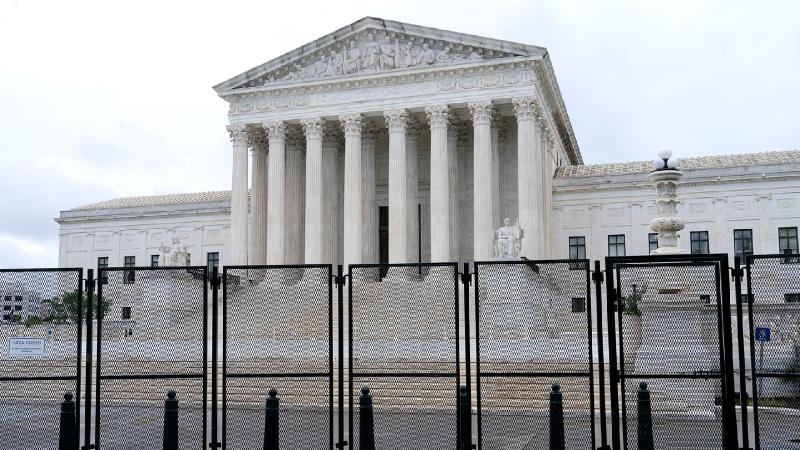Moore v Harper decision: Supreme Court upholds North Carolina ruling that congressional districts violated state law - ABC7 New York



WASHINGTON -- The Supreme Court on Tuesday ruled in a case that threatened to upend state election laws nationwide.
It involved who gets to decide when, where and how Americans vote - and whether state courts can provide a check on the process.
A 6-3 decision by Chief Justice John Roberts rejects a broad interpretation of the so-called "independent state legislature" theory.
The court ruled against Republican lawmakers in a dispute over a North Carolina congressional map.
Roberts was joined by Justices Sonia Sotomayor, Elena Kagan, Ketanji Brown Jackson, Brett Kavanaugh and Amy Coney Barrett.
In Moore v. Harper, the justices were asked to reinstate the state legislature's gerrymandered voting map after the North Carolina Supreme Court struck it down for violating the state constitution.
At the heart of the case was a controversial legal concept dubbed the "independent state legislature" theory, which contends the Elections Clause of the U.S. Constitution provides state legislators alone the power to govern federal elections unencumbered by traditional oversight from state constitutions, courts and governors.
Election and democracy experts warned the theory, if adopted in its most extreme application, could have a dramatic impact on how elections are run and voting rules are written in the U.S.
The Supreme Court on Tuesday rejected the theory, with Chief Justice Roberts writing the Elections Clause "does not insulate state legislatures from the ordinary exercise of state judicial review."Justices Clarence Thomas, Neil Gorsuch and Samuel Alito dissented.
"In interpreting state law in this area, state courts may not so exceed the bounds of ordinary judicial review as to unconstitutionally intrude upon the role specifically reserved to state legislatures by Article I, Section 4, of the Federal Constitution," Roberts wrote.
In their dissent, Justices Thomas, Gorsuch and Alito argued the case should have dismissed given state-level developments. The North Carolina Supreme Court, under a new Republican majority, in April reversed its previous ruling that said the gerrymandered maps were illegal.
"This is a straightforward case of mootness," Thomas wrote. "The federal defense no longer makes any difference to this case- whether we agree with the defense, disagree with it, or say nothing at all, the final judgment in this litigation will be exactly the same."
This is a developing story. Please check back for updates.



At the heart of the case was some bullshit tortured legal logic. To think after 350 some years all of a sudden courts can't check run away state governments?
I was a little confused, I read one article where they slapped down having state electors dismiss and replace with their own or something.
Basically nullifying the will of the people.
I'd have to read the article. I think GA (and/or maybe TX?) was trying to do this with their new election law. I don't remember if it was challenged or not.
I found it.
This wasn't the particulars of this case, but yes this was when we probably first heard about it as a legal idea.
Good!
This is a good thing and hopefully will put an end to the bizarre logic.
No... The case here is when the Democrats had the majority the NC Supreme Court ruled against widely gerrymandered maps and then the two NC lawmakers asked the SCOTUS to rule using the independent state legislature theory. Before the Court could rule on the case the political makeup of the NC Supreme Court changed to majority conservative and they overturned their past ruling. The 3 SCOTUS judges in their decent said the case is now moot and the SCOTUS has no business ruling on cases that no longer matter. It's a legal distinction I can respect even if I don't fully agree.
Obviously the other 6 justices did not agree, which now could have profound effect on the 2024 election where some red states have tried to front load elections laws hoping they can't be overturned on that same idea.
Here's something I found this morning you'll like -
You'll remember Disney is suing DeSantis and the FL State Legislature under the Constitutions Contracts Clause.
Sanity wins the day. Thank God.
I did panic a little when I saw it was 6-3. ‘How could you possibly dissent in this case?” I worried. But the dissenters wanted to dismiss on grounds of mootness, which is fine. It’s at least an arguable point. The idea that state legislatures can just ignore constitutions is bat-shit-crazy-insane.
Well, there are people on here who would say that the state legislatures alone can set voting rules.
Some would say the feds cannot have any say.
They can set rules. But those rules cannot conflict with state or federal constitutions.
Also, those rules are subject to review and change by the US congress.
It is the bolded text that certain people tend to ignore.
Another perspective on this:
-